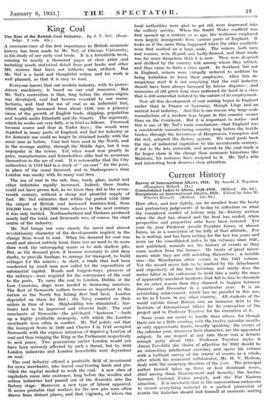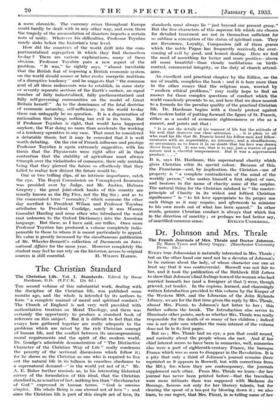Current History
Survey of International Affairs, 1931. By Arnold I. Toynbeo.
(Humphrey Milford. 21s.) Consolidated Index to Above, 1920-1930. (Milford. 12s. 6d.)
How often, and how rightly, arc we recalled from the hasty and perfunctory judgements of to-day to reflection on what the considered verdict of history may be—history written when the dust has cleared and the heat has cooled, when perspective and proportion alike have been restored. Yet year by year Professor Arnold Toynbee forces, or almost forces, on us a conviction of the folly of that attitude. For he is writing, and has been writing for the last ten years and more (as the consolidated index to his volumes since 1920, now published, reminds us), the history of events as they come molten from the furnace. He treats of great move- ments while they are still unfolding themselves ; a notable case—the Manchurian affair—occurs in this 1981 volume. Yet the record never fails to be marked by the detachment and objectivity of the true historian, and rarely does the writer falter in his endeavour to weld into a unity the mass of apparently unrelated incidents that fall to him to chronicle for no other reason than they chanced to happen between January and December in a particular year. It is an astonishing achievement, which has no parallel in this nor, so far as I know, in any other country. All students of the world outside Great Britain owe an immense debt to the Institute of International Affairs for its conception of the project and to Professor Toynbee for his execution of it.
Some years are easier to handle than others, for though there can be a little overlap, with the twelve calendar months as only approximate limits, broadly speaking the events of the calendar year, whatever their character, are the appointed subject. In one respect at any rate there was a definite enough unity about 1931. Professor Toynbee styles it Annus Teri...bilis (his choice of adjective for 1932 should be an interesting intellectual exercise) and opens his volume with a brilliant survey of the course of events as a whole, after which his economist collaborator, Mr. H. V. Hodson, deals with the monetary disasters of the year. The principal author himself takes up three or four dominant issues, chief among them Disarmament and Security, the Austro- German Customs Union project, and the Far Eastern situation. It is inevitable that in the conscientious endeavour to record everything material in a packed procession of events the historian should find himself at moments writing a mere chronicle. The currency crises throughout Europe could hardly be dealt with in any other way, and even there the tragedy of the accumulation of disasters imparts a certain note of unity. Whatever his difficulties, Professor Toynbee rarely sinks below the historian's true level.
How did the countries of the world drift into the com- partmentalized segregation in which they find themselves to-day ? There are various explanations, many of them obvious. Professor Toynbee puts a new aspect of the problem. "It was," he rightly says, alniost inevitable that the British feat of imposing a British economic system on the world should sooner or later evoke energetic rea'etions of a disruptive tendency" and he suggests that "the common goal of all these endeavours was to establish, in some sixty or seventy separate sections of the Earth's surface, an equal number of fully industrialized, fully parliamentarized and fully self-governing communities on the model of Great Britain herself." As to the dominance of the fatal doctrine of economic autarchy, self-sufficiency, in the world to-day there can unhappily be no question. It is a degeneration of nationalism that brings nothing but evil in its train. But if Professor Toynbee is right, that would have happened anyhow, the War doing no more than accelerate the working of a tendency operative in any case. That must be considered a debatable thesis, but it may be conceded that it is well worth debating. On the rise, of French influence and prestige Professor Toynbee is again extremely suggestive, with his thesis that the Physiocrats were right after all in their contention that the stability of agriculture must always triumph over the vicissitudes of commerce, their only mistake being that they pierced the future so effortlessly that they failed to realize how distant the future would be.
. One or two trilling slips, of no intrinsic importance, catch the eye. The Royal Commission on Unemployed Insurance was presided over by Judge, not Mr. Justice, Holman Gregory ; the great joint-stock banks of this country are usually known as the Big Five, not the Big Six ; and as to the consecrated term "normalcy," which someone the other day ascribed to President Wilson and Professor Toynbee attributes to President Coolidge, surely it was Warren Gamaliel Harding and none other who introduced the word (not unknown to the Oxford Dictionary) into the American language. But these, as I have said, are trifles. Once more Professor Toynbee has produced a volume completely indis- pensable to those to whom it is meant particularly to appeal. Its value is greatly increased by the simultaneous publication of Mr. Wheeler-Bennett's collection of Documents on Inter- national Affairs for the same year. However completely the student may feel he can rely on the historian, access to original-





































 Previous page
Previous page